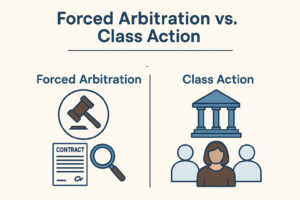
In today’s marketplace, consumers often encounter contracts—be it for credit cards, cell phones, auto financing, warranty documents, or online services—that include forced arbitration clauses. These clauses require disputes to be resolved through private arbitration rather than in court. While arbitration can be efficient, forced arbitration may limit consumers’ rights, particularly when it comes to participating in class action lawsuits.
Understanding Forced Arbitration
Forced arbitration clauses are typically embedded in the fine print of consumer contracts. They mandate that any disputes be settled through arbitration, often prohibiting consumers from joining class actions. This means that even if numerous consumers are affected by the same issue—such as a defective product or deceptive practice—they must pursue individual claims in arbitration.
In Arizona, the prevalence of forced arbitration has raised concerns. According to the National Consumer Law Center, such clauses can strip Arizonans and consumers in other states of their constitutional right to a day in court, replacing it with a process that could favor corporations.
The Role of Class Actions
Class action lawsuits allow a group of individuals with similar grievances to sue a defendant collectively. This is particularly beneficial when individual claims might be too small to pursue separately but collectively represent significant harm.
For instance, in Arizona, class actions have been instrumental in holding companies accountable for deceptive practices. The Arizona Attorney General’s Office has the authority to bring civil enforcement lawsuits under the Consumer Fraud Act, providing a mechanism for collective redress.
How This Affects Consumers
- Limited Recourse: Forced arbitration can prevent consumers from seeking justice through the courts, even in cases of widespread harm.
- Lack of Transparency: Arbitration proceedings are private, meaning outcomes are not part of the public record, potentially allowing harmful practices to continue unchecked.
- Potential Bias: Arbitrators are often selected by the companies involved, raising concerns about impartiality.
Protecting Your Rights
Consumers should be vigilant when entering into contracts. Here are steps to consider:
- Read the Fine Print: Before signing, look for arbitration clauses and understand their implications.
- Seek Legal Advice: If you’re unsure about a contract’s terms, consult with a legal professional.
- File Complaints: If you believe a company has engaged in deceptive practices, you can file a complaint with the Arizona Attorney General’s Office.
- Opting Out of Arbitration: Action Required: Some contracts include an arbitration clause and a limited-time opportunity for consumers to opt out of it. However, opting out usually requires the consumer to take specific steps—such as sending a written notice to a designated address within a certain number of days after signing. Failing to act in time means the arbitration clause will remain binding.
A. Ferraris Law: Advocating for Consumer Justice
At A. Ferraris Law, we are steadfast in our commitment to protecting consumer rights. We recognize the obstacles forced arbitration can create and are dedicated to educating the public and guiding our clients through the legal complexities these clauses present. Our mission is to ensure that Arizona consumers have access to fair, transparent, and effective remedies under the law.
Further Reading:
The information provided does not, and is not intended to, constitute legal advice; instead, all information is for general informational purposes only. This information may not constitute the most up-to-date information. Links provided are only for the convenience of the reader, A. Ferraris Law, PLLC, and its members do not endorse the contents of the third-party references.
Copyright©2025, A. Ferraris Law, PLLC. All Rights Reserved.







